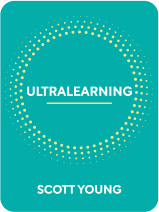

This article is an excerpt from the Shortform book guide to "Ultralearning" by Scott Young. Shortform has the world's best summaries and analyses of books you should be reading.
Like this article? Sign up for a free trial here .
Are you or somebody you know struggling to learn in a traditional, classroom environment? Could using an alternative learning approach such as ultralearning be the answer?
There are many forms of alternative learning, but here we will be focusing on ultralearning. Ultralearning isn’t just for people in school, it’s for people in every walk of life and it can be used to learn any skill from speaking another language to playing sports.
Keep reading for alternative learning strategies and approaches.
What Is Alternative Learning?
Learning in a traditional classroom environment isn’t for everybody. There are several alternative learning methods and the one we will discuss in this article is ultralearning.
Ultralearning is not just limited to the experience of the individual. Ultralearning strategies and perspectives are valuable for all aspects of life and society. Broader goals might include self-sufficient students who understand how to direct their learning outside of the classroom or ambitious employees taking the initiative to improve their skill sets and contribute to the goals of their companies. Whatever the endgame, there are three strategies that will powerfully encourage an ultralearning approach in any environment.
Strategy #1: Prioritize Inspiration
Inspiration is a critical part of what motivates us to learn. That inspiration can be extrinsic, like the excitement of taking a new direction in your career, the hope that what you’re learning will result in financial success, or the anticipation of a fit body. It can also be intrinsic, like taking up dancing because you’ve always enjoyed watching others dance and you want to learn for fun. It doesn’t matter what your motivation is, as long as it’s powerful enough for you to invest in. For example, if you’re an educator, you might implement a lesson plan where your students get to design their own topic of study for a trimester. This allows them to get excited about a topic and pursue understanding from intrinsic inspiration.
Strategy #2: Use Competition to Your Advantage
Be mindful of how your learning environment can impact your confidence. If you have natural talent at a skill, try putting yourself in competitive practice environments with peers to encourage self-confidence. If you are of moderate or low talent, try a more creative and individualized approach to practice (this will encourage you to measure your growth in competition with yourself rather than your peers). In many cases, you may start out with a more individualized approach and evolve to competitive environments.
Early self-confidence is an important part of the ultralearning process. It’s not necessary to already be skilled at something to get invested in learning it, but it is necessary to believe it’s possible to become skilled. For example, if your perception of math is that you’re terrible at it and will never learn, you will not feel motivated to improve (it becomes a self-fulfilling prophecy). Alternatively, if your perception of math is that you don’t understand it but with time and effort could gain proficiency, you are more likely to pursue that goal.
Strategy #3: Focus on Learning
Rather than using a specific end result to motivate your learning, let learning itself motivate your goals. For example, if you’re an employer, give your employees work they can complete relatively easily, but regularly give them small projects requiring skills they don’t yet have. Your employees get to struggle through learning new skills and this encourages a collective learning driven mentality in the workplace.
In our society, we often use learning as a means to an end, rather than making it the goal on its own. For example, you take a coding class at work not to deeply learn coding, but to complete a list of new tasks your employer wants to add to your job. The benefit of focusing on learning is that it teaches employees to work through solving difficult problems and reveals individual and organizational strengths that might have otherwise gone undiscovered.
A Note on Alternative Learning
While ultralearning strategies may be a perfect fit for you, there is still value to other learning approaches. There are two notable alternative approaches you might consider.
Alternative Approach #1: Low-Intensity Learning
Habits exist on a spectrum. On one end, habits require little to no effort, on the other, they require intensive effort (ultralearning). The majority fall into the middle, requiring moderate effort. Typically, as proficiency increases, so does enjoyment. Low-intensity learning habits (for example, practicing Spanish sporadically with no specific proficiency goals) can be enjoyable, but not as efficient or effective as ultralearning habits. They’re effective when you’re learning at a leisurely pace, for the purpose of enjoyment, or as a strategy for maintenance after the conclusion of an ultralearning project. For example, if you’re learning a new language but aren’t giving yourself time constraints, or you are just learning for fun, you might, upon reaching basic proficiency, simply travel to the applicable country and naturally improve with immersion.
Habits are most effective when your learning process consists of gradual addition of new pieces of knowledge or abilities. In contrast, the ultralearning approach is most effective when what is being learned is challenging, or triggers mental obstacles within the learner to be worked with and overcome. For example, if you’re upgrading your skillset in the sales field, you might use ultralearning to replace out-of-date communication skills with new communication skills that reflect the modern sales environment (like pitching to clients digitally versus making cold calls or conducting door-to-door sales).
Alternative Approach #2: Traditional Education
As stated, ultralearning doesn’t have to be done alone. It’s characterized by being self-directed, and if you determine that formal education is effective for you, the use of it is still aligned with ultralearning. What is most important is that you use ultralearning to create more opportunities for yourself. No approach is discounted.
There are a few benefits to prioritizing formal education over ultralearning.
#1: Credentials
If you’re learning for professional purposes and your target profession will benefit from credentials, formal education is a smart approach.
#2: Beneficial Learning Environment
Some elements of formal education slow or impede learning, but there are other elements you only find in the traditional setting. For example, if you’re an artist, you’ll benefit from the apprenticeship-style approach of many well-regarded art schools. Other concentrations may benefit from programs that facilitate team learning experiences.
#3: Community
If you go to graduate school, you will likely have access to an entire community that lives and breathes your educational focus, which will provide you with invaluable information from specialists and access to opportunities you may not find learning on your own.
Conclusion
In the end, the ultimate benefit of becoming a well-practiced ultralearner is that you set yourself up to continually strengthen and expand your capacity for learning throughout life. Through the use of ultralearning strategies, the possibilities for developing your full potential are limitless.

———End of Preview———
Like what you just read? Read the rest of the world's best book summary and analysis of Scott Young's "Ultralearning" at Shortform .
Here's what you'll find in our full Ultralearning summary :
- How a formal education doesn’t open the doors it once could
- The 9 core principles that can help you master any skill
- How to create a self-directed learning project to help you advance in your field






